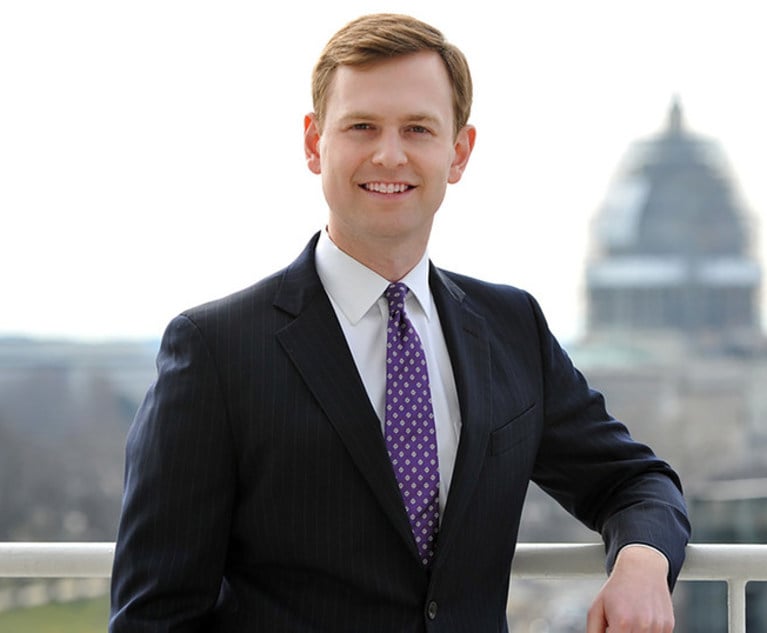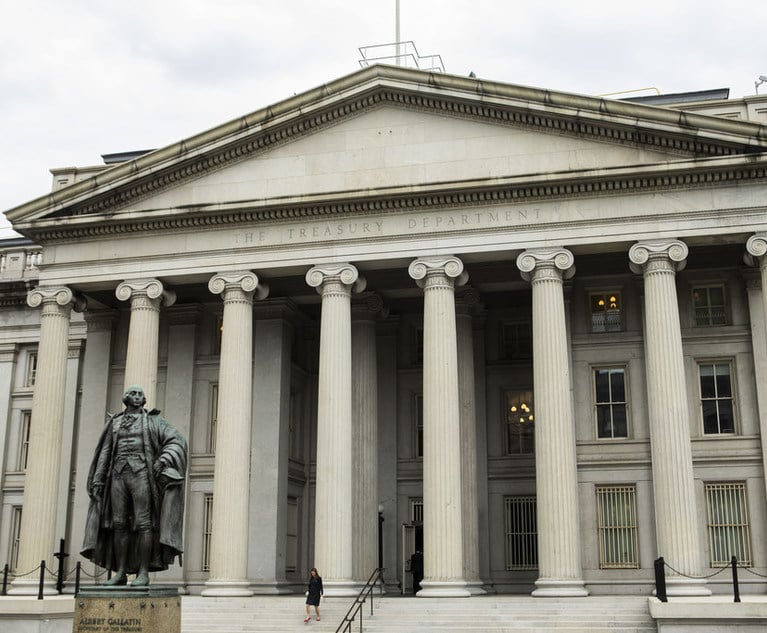Regulatory: Do agencies have the power to determine the scope of their own jurisdiction?
In 1984, the Supreme Court dealt with the question of whether agencies have the power to construe the statutes they are assigned to administer.
February 06, 2013 at 03:30 AM
9 minute read
The original version of this story was published on Law.com
In 1984, the Supreme Court dealt with the question of whether agencies have the power to construe the statutes they are assigned to administer. In Chevron USA v. Natural Resources Defense Council, the court gave administrative agencies broad authority to interpret the laws they are charged with administering. The court held that if Congress has explicitly left a gap for the agency to fill, then the agency is expressly delegated authority to fill the gap. Sometimes delegation of authority to an agency is implicit rather than explicit. The court held in such cases a court may not substitute its own construction of the statute for that of the agency. The court, citing an earlier case, summarized the rule as follows: “If this choice represents a reasonable accommodation of conflicting policies that were committed to the agency's care by the statute, we should not disturb it unless it appears from the statue or its legislative history that the accommodation is not one that Congress would have sanctioned.”
Now before the Supreme Court in City of Arlington v. FCC is the question of whether or not similar rules apply when an agency is determining the scope of its own power and jurisdiction. Should the courts defer to an agency's determination of the scope of its jurisdiction the way courts defer to agency judgment in administering their substantive areas? This question is controversial. One commentator has said, “Just as foxes should not guard henhouses, agencies should not be entrusted to police the limits of their regulatory authority.” Others, notably the agencies themselves, argue that agencies are in the best position to determine the scope of a congressional grant of jurisdiction.
City of Arlington involves the Federal Communication Commission's (FCC) administration of the Telecommunications Act of 1996 (TCA). The FCC is charged with regulating the national cellular telephone network. The TCA directs the FCC to address radio frequency matters. At the same time, the statute took a “cooperative federalism” approach to matters related to zoning for the construction of wireless transmission facilities. The act states “nothing in this Act shall limit or affect the authority of a State of local government or instrumentality thereof over decision regarding the placement, construction, and modification of personal wireless service facilities.”
In response to the statutory approach of the act, states and local governments adopted various zoning rules. As would be expected, the state and local rules varied widely, as did the time limits contained with those rules. The individual rules dealt with various interests of the states, including, for example, specific environmental assessment rules in California, longer time periods in Connecticut and the like.
This left the wireless industry to comply with the myriad of conflicting zoning rules from the various state and local jurisdictions. In 2008, the wireless industry requested the FCC to adopt rules requiring short, uniform deadlines for state and local zoning action under the Communications Act. In response, the agency adopted such uniform zoning rules, requiring state and local governments to act in accordance with both the act and limitations defined by the agency. The FCC took this action even in view of the statutory requirement that nothing in the act limits state or local zoning authority and essentially overruled various state zoning laws.
In City of Arlington a number of states, local governments and others challenged the FCC rules, arguing that the measures extended beyond the jurisdictional limits of the Communications Act. The 5th Circuit has upheld the FCC rules applying Chevron. The court held that the deference to agency action delineated in Chevron extended to a determination by the agency of the scope of its own jurisdiction. Thus, even in view of the TCA's provision that nothing in the act shall limit state or local authority over zoning, as well as some clear legislative history discussing the desire for a cooperative federalism approach, the circuit court held the FCC had authority to impose uniform zoning rules on the states.
Other circuits have taken an entirely different approach, holding that Chevron deference does not extend to a determination of the scope of agency jurisdiction. For example, the 7th Circuit has said that “although agency determinations within the scope of delegated authority are entitled to deference, it is fundamental that an agency may not bootstrap itself into an area in which it has no jurisdiction.”
Since there is a clear conflict in the circuits, the Supreme Court has granted certiorari. Petitioners believe “the limits of an agency's jurisdiction is purely legal, not a policy, question that does not implicate agency expertise.” Therefore, they believe the FCC rule should be overturned.
Oral argument before the Supreme Court has been completed and a decision is expected later this term.
In 1984, the Supreme Court dealt with the question of whether agencies have the power to construe the statutes they are assigned to administer. In
Now before the Supreme Court in City of Arlington v. FCC is the question of whether or not similar rules apply when an agency is determining the scope of its own power and jurisdiction. Should the courts defer to an agency's determination of the scope of its jurisdiction the way courts defer to agency judgment in administering their substantive areas? This question is controversial. One commentator has said, “Just as foxes should not guard henhouses, agencies should not be entrusted to police the limits of their regulatory authority.” Others, notably the agencies themselves, argue that agencies are in the best position to determine the scope of a congressional grant of jurisdiction.
City of Arlington involves the Federal Communication Commission's (FCC) administration of the Telecommunications Act of 1996 (TCA). The FCC is charged with regulating the national cellular telephone network. The TCA directs the FCC to address radio frequency matters. At the same time, the statute took a “cooperative federalism” approach to matters related to zoning for the construction of wireless transmission facilities. The act states “nothing in this Act shall limit or affect the authority of a State of local government or instrumentality thereof over decision regarding the placement, construction, and modification of personal wireless service facilities.”
In response to the statutory approach of the act, states and local governments adopted various zoning rules. As would be expected, the state and local rules varied widely, as did the time limits contained with those rules. The individual rules dealt with various interests of the states, including, for example, specific environmental assessment rules in California, longer time periods in Connecticut and the like.
This left the wireless industry to comply with the myriad of conflicting zoning rules from the various state and local jurisdictions. In 2008, the wireless industry requested the FCC to adopt rules requiring short, uniform deadlines for state and local zoning action under the Communications Act. In response, the agency adopted such uniform zoning rules, requiring state and local governments to act in accordance with both the act and limitations defined by the agency. The FCC took this action even in view of the statutory requirement that nothing in the act limits state or local zoning authority and essentially overruled various state zoning laws.
In City of Arlington a number of states, local governments and others challenged the FCC rules, arguing that the measures extended beyond the jurisdictional limits of the Communications Act. The 5th Circuit has upheld the FCC rules applying
Other circuits have taken an entirely different approach, holding that
Since there is a clear conflict in the circuits, the Supreme Court has granted certiorari. Petitioners believe “the limits of an agency's jurisdiction is purely legal, not a policy, question that does not implicate agency expertise.” Therefore, they believe the FCC rule should be overturned.
Oral argument before the Supreme Court has been completed and a decision is expected later this term.
This content has been archived. It is available through our partners, LexisNexis® and Bloomberg Law.
To view this content, please continue to their sites.
Not a Lexis Subscriber?
Subscribe Now
Not a Bloomberg Law Subscriber?
Subscribe Now
NOT FOR REPRINT
© 2025 ALM Global, LLC, All Rights Reserved. Request academic re-use from www.copyright.com. All other uses, submit a request to [email protected]. For more information visit Asset & Logo Licensing.
You Might Like
View All
FTC Finalizes Child Online Privacy Rule Updates, But Ferguson Eyes Further Changes

Supreme Court Reinstates Corporate Disclosure Law Pending Challenge

The New Trump Worksite Enforcement Paradigm: Everything You Need to Know
14 minute read
Antitrust in Trump 2.0: Expect Gap Filling from State Attorneys General
6 minute readTrending Stories
- 1No Two Wildfires Alike: Lawyers Take Different Legal Strategies in California
- 2Poop-Themed Dog Toy OK as Parody, but Still Tarnished Jack Daniel’s Brand, Court Says
- 3Meet the New President of NY's Association of Trial Court Jurists
- 4Lawyers' Phones Are Ringing: What Should Employers Do If ICE Raids Their Business?
- 5Freshfields Hires Ex-SEC Corporate Finance Director in Silicon Valley
Who Got The Work
J. Brugh Lower of Gibbons has entered an appearance for industrial equipment supplier Devco Corporation in a pending trademark infringement lawsuit. The suit, accusing the defendant of selling knock-off Graco products, was filed Dec. 18 in New Jersey District Court by Rivkin Radler on behalf of Graco Inc. and Graco Minnesota. The case, assigned to U.S. District Judge Zahid N. Quraishi, is 3:24-cv-11294, Graco Inc. et al v. Devco Corporation.
Who Got The Work
Rebecca Maller-Stein and Kent A. Yalowitz of Arnold & Porter Kaye Scholer have entered their appearances for Hanaco Venture Capital and its executives, Lior Prosor and David Frankel, in a pending securities lawsuit. The action, filed on Dec. 24 in New York Southern District Court by Zell, Aron & Co. on behalf of Goldeneye Advisors, accuses the defendants of negligently and fraudulently managing the plaintiff's $1 million investment. The case, assigned to U.S. District Judge Vernon S. Broderick, is 1:24-cv-09918, Goldeneye Advisors, LLC v. Hanaco Venture Capital, Ltd. et al.
Who Got The Work
Attorneys from A&O Shearman has stepped in as defense counsel for Toronto-Dominion Bank and other defendants in a pending securities class action. The suit, filed Dec. 11 in New York Southern District Court by Bleichmar Fonti & Auld, accuses the defendants of concealing the bank's 'pervasive' deficiencies in regards to its compliance with the Bank Secrecy Act and the quality of its anti-money laundering controls. The case, assigned to U.S. District Judge Arun Subramanian, is 1:24-cv-09445, Gonzalez v. The Toronto-Dominion Bank et al.
Who Got The Work
Crown Castle International, a Pennsylvania company providing shared communications infrastructure, has turned to Luke D. Wolf of Gordon Rees Scully Mansukhani to fend off a pending breach-of-contract lawsuit. The court action, filed Nov. 25 in Michigan Eastern District Court by Hooper Hathaway PC on behalf of The Town Residences LLC, accuses Crown Castle of failing to transfer approximately $30,000 in utility payments from T-Mobile in breach of a roof-top lease and assignment agreement. The case, assigned to U.S. District Judge Susan K. Declercq, is 2:24-cv-13131, The Town Residences LLC v. T-Mobile US, Inc. et al.
Who Got The Work
Wilfred P. Coronato and Daniel M. Schwartz of McCarter & English have stepped in as defense counsel to Electrolux Home Products Inc. in a pending product liability lawsuit. The court action, filed Nov. 26 in New York Eastern District Court by Poulos Lopiccolo PC and Nagel Rice LLP on behalf of David Stern, alleges that the defendant's refrigerators’ drawers and shelving repeatedly break and fall apart within months after purchase. The case, assigned to U.S. District Judge Joan M. Azrack, is 2:24-cv-08204, Stern v. Electrolux Home Products, Inc.
Featured Firms
Law Offices of Gary Martin Hays & Associates, P.C.
(470) 294-1674
Law Offices of Mark E. Salomone
(857) 444-6468
Smith & Hassler
(713) 739-1250






